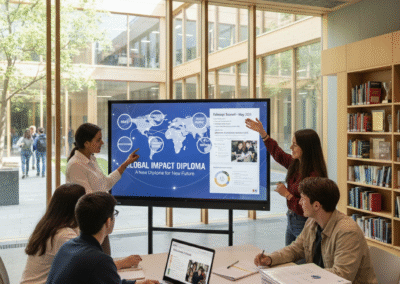Do students feel that their voice is valued? Are international schools listening to student voice to inform change? Recent research by ISC Research delved into this subject, surveying students and alumni to gather their thoughts alongside a separate survey to educators and administrators.
A culture shift within schools
The results of the research show that some international schools are encouraging student voice. Just over half of the student respondents said that, in the last two years, they believe there has been an improvement in the elevation of student voice in their school. Some students, however, feel the changes are ‘limited’, ‘patronising’ or ‘tokenistic’. This suggests that, while schools are working towards change, there is a learning process for school leaders and educators to ensure the change is authentic.
Who are the catalysts to change?
In the survey, we asked educators and administrators who they felt had been responsible for promoting change in their school. 70% credited students for the culture shift, while 84% credited school leaders and 55% credited teachers. They believe the triggers promoting change include internal school community initiatives, educational research, the impact of COVID and the influence of movements supporting equity and inclusion.
We know from the research that young people want to speak out, and while some international schools are giving students more of a voice, this is a continual process of change and improvement. The report enables schools to informally benchmark where they sit on a student voice continuum and this can act as a resource within a school’s improvement plan.
As part of the research, we spoke with a number of international school leaders about a range of student voice initiatives they are implementing. Details of these, along with advice for other schools, are included in the report. Lauren Jones, Director of International School of Kigali in Rwanda, who was interviewed, says “the impact of elevating student voice, especially for our most marginalised students, reaches beyond what we can measure.”
How are students able to raise their voices?
Dr Jaime Pustis, High School Principal at American School of Guatemala is also featured in the report. She explains that “creating a variety of different avenues for students to share their voice has been the key in gaining the perspectives of a diverse group of our student population.”
However, the research results suggest that many international schools are relying on traditional channels which can be very limiting for giving some students a voice, such as the student council. 9% of student respondents said there is no dedicated channel available to them in their school for students to share ideas, opinions and feedback.
The report recommends that schools may want to evaluate their approach to student voice, including the current student voice channels they use, who accesses these channels, and who might feel ostracised and why.
The Listening to international school student voices report includes data and intelligence about current support of student voice within the international schools market and is available to download from our website now.
Thanks to Pearson for sponsoring the report, ensuring that it is free to all.
Pia Maske, East Asia Research Manager, discusses some of the findings from our research in our student voice webinar. Including two international school consultants who contributed to the research report: Matthew Savage, Independent Consultant and a former International School Principal, and Joel Jr Llaban, Director of Diversity, Equity, Inclusion and Justice at the International Schools Services (ISS). Watch the recording over on the ISC Research Community, sign up for free here >



